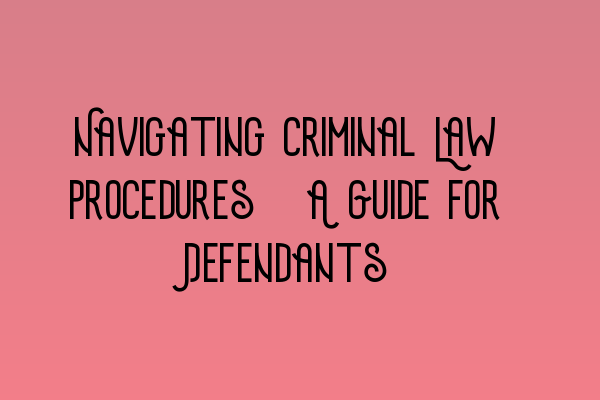Navigating Criminal Law Procedures: A Guide for Defendants
Being involved in a criminal case can be an overwhelming and challenging experience. The procedures and legalities surrounding criminal law can seem complex and confusing, but understanding the process is essential for any defendant. In this guide, we will navigate through the various steps of criminal law procedures, providing valuable insights and information to help you better comprehend your rights, options, and responsibilities.
The Arrest and Initial Proceedings
The first step in the criminal law process is the arrest. This occurs when the police have reasonable grounds to believe that you have committed a criminal offense. Upon arrest, you will be informed about the nature of the charges against you and your rights, commonly referred to as the caution.
Once arrested, you may be held in police custody for questioning. It is crucial to exercise your right to legal representation during this stage. Hiring a reputable criminal defense solicitor, such as SQE Criminal Law & Practice Law UK, can greatly assist in protecting your rights and providing guidance throughout the process.
After the initial questioning, the police may decide to release you on bail or hold you in custody until further proceedings. Bail is when you are allowed to remain in the community under certain conditions set by the court. If bail is denied, you will be held in custody until your court appearance.
The Court Process
Once your case reaches court, there are several key stages in the criminal law process that you should be aware of. These include:
- Arraignment: This is the formal court appearance where you will be asked to enter a plea of guilty or not guilty. It is essential to consult your solicitor before making any plea.
- Case Management Hearings: These hearings are scheduled to manage the progress of your case, including setting trial dates, discussing evidence, and considering any legal issues.
- Disclosure: This stage involves the exchange of evidence and information between the prosecution and defense. It is vital to review the evidence with your solicitor to build a strong defense strategy.
- Pre-trial Preparation: This phase allows you and your solicitor to prepare your defense, interview witnesses, gather evidence, and assess the strength of the prosecution’s case.
- Trial: This is when the evidence is presented, witnesses testify, and legal arguments are made. Your solicitor will advocate on your behalf to ensure a fair trial.
- Sentencing: If found guilty, the court will determine an appropriate sentence. Your solicitor can present mitigating factors to potentially lessen the severity of the sentence.
Throughout these court proceedings, it is crucial to have a skilled and knowledgeable solicitor by your side. They will protect your interests, challenge the prosecution’s case, and ensure your rights are upheld.
Conclusion
Navigating criminal law procedures as a defendant can be overwhelming, but with the right guidance and support, you can effectively maneuver through the system. Hiring an experienced criminal defense solicitor is essential, as they can provide legal expertise, represent your interests, and ensure a fair trial.
At SQE Criminal Law & Practice Law UK, we offer comprehensive SQE 1 and SQE 2 preparation courses to equip aspiring solicitors with the necessary knowledge and skills required in the field of criminal law. To check our SQE 1 Practice Exam Questions, SQE 1 Practice Mocks FLK1 FLK2, SQE 2 Preparation Courses, SQE 1 Preparation Courses, and SRA SQE Exam Dates, visit our website today!
